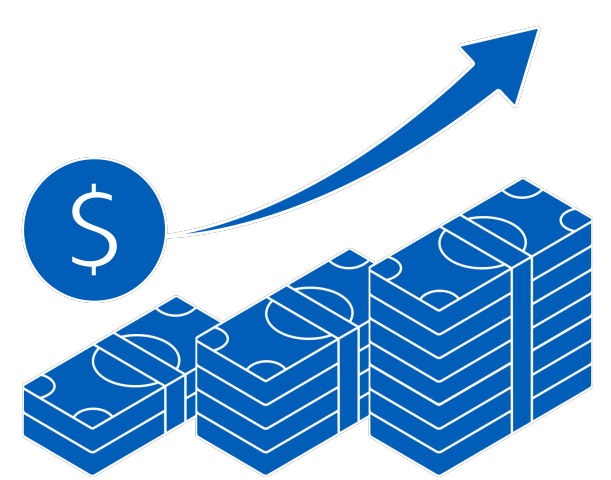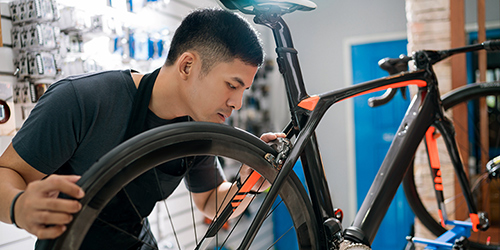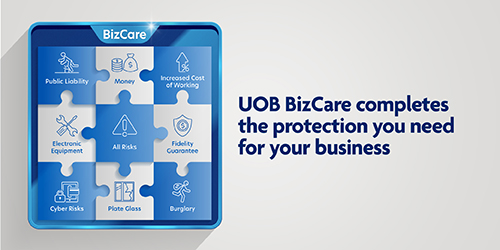You are now reading:
Seven ways to kickstart your company’s sustainability journey
1 of 3


you are in GROUP WHOLESALE BANKING


You are now reading:
Seven ways to kickstart your company’s sustainability journey
Small businesses can make a significant social and environmental impact, and there’s never been a better time to develop business sustainability goals.
Increasingly, driving a sustainable business can benefit both the planet and your bottom line. One in three ASEAN consumers today is willing to pay a premium for sustainably-sourced products and services. As an SME, you can elevate your brand by championing change, building the future of ASEAN for the next generation, and generations that follow.
Yet for many SMEs, getting started on the sustainability journey can seem daunting. In the ASEAN SME Transformation Study 2022 by UOB, in collaboration with Accenture and Dun & Bradstreet, “high initial costs” emerged as the top barrier to sustainability for ASEAN SMEs. 60 per cent cited costs like training and research as a critical challenge, while another 48 per cent saw lack of know-how as an obstacle to progress.
In this short guide, we break down how SME owners can take the first step to embrace sustainability in a beginner-friendly way.
Simply put, doing business sustainably means minimising a company’s negative impact on the environment and community as a whole. Businesses must strive to balance financial goals with a responsibility to society.
The United Nations has outlined 17 well-known Sustainable
Development Goals (SDGs) as a framework for a sustainable future. SMEs can make a meaningful difference in many of these goals, from ‘responsible consumption and production patterns’ to ‘decent work and economic growth’.
Here’s an overview of how to boost sustainability through seven key steps in your business value chain.
For SMEs across ASEAN, “developing new business models, products, and services” is top-of-mind when going sustainable. 57% of SMEs highlighted this as a priority in UOB’s ASEAN SME
Transformation Study 2022.
To innovate more sustainable business models, you can start by broadening your understanding of the stakeholders you create value for. Rather than considering key stakeholders like investors and customers, broaden your considerations to include stakeholders involved in your business value chain, and the impact of your business operations on the environment and local communities.
Next, consider business sustainability and other ESG factors in your product innovation process. For instance, you can consider:
SMEs are an inevitable part of the value chains of multinational corporations (MNCs). Not only will an SME’s performance impact the large corporations they cater to, but SMEs will also be under the same scrutiny when it comes to responsible supply chain practices. And as companies ramp up their commitments to the Global Goals, an SME’s sustainability performance will be part of the supplier assessment metrics of large corporations.
While large corporations are taking concrete steps to help SMEs strengthen their ESG capabilities, SMEs can also jumpstart their own green initiatives. For your raw materials, switch to suppliers that align with international sustainability standards. Some important factors to consider include:

If you want a more in-depth assessment, UOB’s sustainable finance frameworks help companies evaluate their impacts throughout the value chain and strengthen their supply chain resilience with support from accredited assessment parties.
UOB’s Green Financing Framework for Circular Economy, for one, helps SMEs qualify their business activities for the ‘5Rs’ of the circular economy: reduce, reuse and recycle waste materials; reuse and repair products to restore their functionality; and remanufacturing to create new products with different functionalities. UOB’s Green and Sustainable Trade Finance and Working Capital Framework, on the other hand, provides short-term working capital financing for sustainability-linked projects and initiatives.
Global supply chains account for the majority of the world’s carbon emissions, owing to the energy consumed by shipping, storage, temperature control and refrigeration. To improve this situation, we must also improve the corporate sustainability profile of SMEs involved in the global supply chain.
Sourcing locally can eliminate much of these carbon miles, all while supporting the development of local communities. Additionally, SMEs must also be equipped to measure and manage their impacts at different points in the value chain.
The UOB Sustainability Compass provides SMEs with a customised report, with clear and actionable insights based on their sector, business maturity, and stage in the sustainability journey. The simple online tool has helped businesses track their carbon emission levels, identify key impacts on the supply chain, and pinpoint exactly where they are on their ESG journey.
Packaging generates massive amounts of single-use plastic, clogging up landfills and polluting the environment. The good news is that recyclable and compostable alternatives are readily available these days. Here are some starting points to tackle:
For F&B businesses:
For retailers:
With the help of digital tools, waste management does not need to be arduous for SMEs. These are some solutions for common pain points that you can adopt:
For F&B businesses:
For retailers:
Sustainability encompasses socially conscious goals, such as reducing inequality and promoting employment for all. You can advance your sustainability strategy by hiring inclusively, enabling you to tap into talent from all walks of life.
Adopt inclusive hiring practices such as:
Achieving energy efficiency can help SMEs cut costs in the long term while reducing their carbon footprint.
For F&B owners, investing in energy-saving appliances can go a long way – for instance, refrigerators certified energy-efficient, convection ovens, and electric fryers. Install low-flow spray valves to save water, and perform regular maintenance on your appliances to keep them running correctly. During the day, you can also take advantage of natural light over artificial lighting to illuminate your space.
For retailers with a brick-and-mortar space, install energy-efficient lighting like LEDs and lighting sensors to reduce your electricity bill.
In understanding such needs, UOB has simplified sustainable financing for business through a three-pronged approach:
Ready to get started? Visit UOB’s Sustainability Compass to learn more about how you can chart your sustainability journey with confidence and build a more resilient business.
Want more actionable insights to jumpstart your business’s sustainability journey? Download UOB’s ASEAN SME Transformation Study 2022. Done in collaboration with Accenture and Dun & Bradstreet (D&B), the study gathered insights from over 1,500 regional SMEs, gleaning effective strategies for business expansion, digitalisation and sustainability.
The information contained in this publication is based on certain assumptions and analysis of publicly available information and reflects prevailing conditions as of the date of the publication. Any opinions, projections and other forward-looking statements regarding future events or performance of, including but not limited to, countries, markets or companies are not necessarily indicative of, and may differ from actual events or results.
The views expressed within this publication are solely those of the author’s and are independent of the actual trading positions of United Overseas Bank Limited, its subsidiaries, affiliates, directors, officers and employees (“UOB Group”). Views expressed reflect the author’s judgment as at the date of this publication and are subject to change.
UOB Group may have positions or other interests in, and may effect transactions in the securities/instruments mentioned in the publication. This publication is not an offer, recommendation, solicitation or advice to buy or sell any product or enter into any transaction and nothing in this publication constitutes accounting, legal, regulatory, tax, financial or other advice. Please consult your own professional advisors about the suitability of any transaction/ investment product/securities/ instruments for your investment objectives, financial situation and particular needs.
UOB Group may have also issued other reports, publications or documents expressing views which are different from those stated in this publication. Although every reasonable care has been taken to ensure the accuracy, completeness and objectivity of the information contained in this publication, UOB Group makes no representation or warranty, whether express or implied, as to its accuracy, completeness and objectivity and accept no responsibility or liability relating to any losses or damages howsoever suffered by any person arising from any reliance on the views expressed or information in this publication.
This publication has not been reviewed by the Monetary Authority of Singapore.

Start your UOB eBusiness account today, and enjoy zero fees* and more than S$500 of annual savings on FAST and GIRO transaction fees.

Get 10% off when you sign up for BizCare. Protect your business against business interruption with an SME-tailored plan.
T&Cs apply.

29 Apr 2025 • 3 mins read

23 Apr 2025 • 3 mins read

22 Apr 2025 • 12 mins read

10 Apr 2025 • 3 mins read